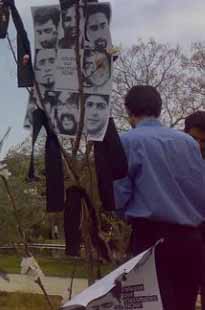| Home > 30 years human rights in Iran > Articles of the Universal Decleration of Human Rights > Article 11 of the Universal Declaration of Human Rights | |||
Article 11 of the Universal Declaration of Human Rightsby Mohammad MostafaieAs part of our special series focusing on the Universal Declaration of Human Rights, Mohammad Mostafaie, an attorney and a human rights activist, discusses Article 11 of the Declaration. Article 11 of the Universal Declaration of Human Rights, in two parts, states: “(1) Everyone charged with a penal offense has the right to be presumed innocent until proved guilty according to law in a public trial at which he has had all the guarantees necessary for his defense. (2) No one shall be held guilty of any penal offense on account of any act or omission which did not constitute a penal offense, under national or international law, at the time when it was committed. Nor shall a heavier penalty be imposed than the one that was applicable at the time the penal offense was committed.” The spirit of this article – the presumption of innocence – also exists in various domestic laws and legislation and even in Sharia law (Islamic canon law). Moreover, Article 37 of the Iranian Constitution specifically addresses this issue by stating: “Innocence is to be presumed, and no one is to be held guilty of a charge unless his or her guilt has been established by a competent court.” Hence, being accused of a crime is by no means proof of guilt. Guilt can only be established if the accused receives a fair trial in a legal and impartial court. Furthermore, any such hearing must allow the defendant to retain a defense attorney for representation during the proceedings, provide sufficient time for defense, not resort to torture or mistreatment, present evidence or documents proving guilt and ultimately make the case beyond a reasonable doubt. In addition, the defendant and his or her attorney must have access to the same documents and evidence the prosecution has and intends to use in making its case on culpability. Also, the proceedings must be open and public. Closed trials are permissible and legal only under very special circumstances. All of the above is stressed and unambiguously stated in Article 11 of the Declaration, Iran’s Criminal Code as well as other domestic laws and statutes. Another important point is that no one can be convicted of a crime unless such an offense is expressly defined in law. In other words, one cannot be found guilty of anything and punished for it, if the offense and its punishment cannot be attributed to a particular law, statute or legislation. For example, on cyber and computer crimes, as well as on political offenses, Iranian law is mostly silent. In other words, these offenses have not been codified into law. Consequently, in a legal sense, those who have been tried, convicted and incarcerated on political charges are not guilty of any crime. Of course, it should be said that many political prisoners have been charged and convicted of other (non-political) offenses. In conclusion, all countries – including Iran – must adhere to the principles set forth in the Universal Declaration of Human Rights by holding fair and impartial hearings, upholding human rights and preventing the miscarriage of justice. |
|||
 |












